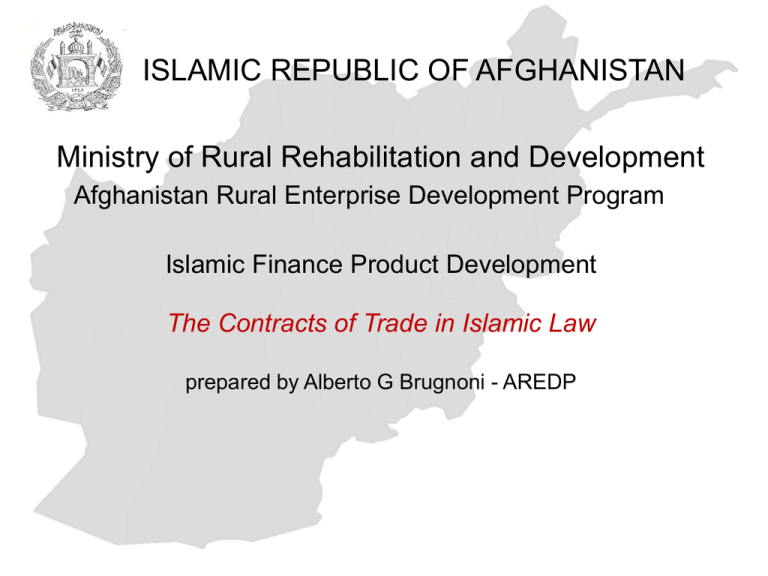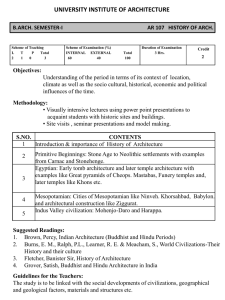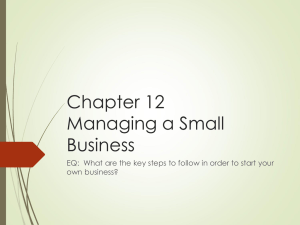The Contracts of Trade in Islamic Law
advertisement

ISLAMIC REPUBLIC OF AFGHANISTAN Ministry of Rural Rehabilitation and Development Afghanistan Rural Enterprise Development Program Islamic Finance Product Development The Contracts of Trade in Islamic Law prepared by Alberto G Brugnoni - AREDP CONTENT I. ISLAMIC CONTRACTS II. ISLAMIC CONTRACTS AS MODES OF FINANCING III. RULES OF THE CONTRACT OF SALE IV. DIFFERENT CONTRACTS OF SALE 2 I. ISLAMIC CONTRACTS The different forms of commercial Islamic contracts that are in general use can notwithstanding several differences of understanding - be divided into three primary categories: → contracts of trade (mu’awada) = sales-based contracts → contracts of participation = investment partnerships → supporting contracts = hibah (gift), contracts of safe custody, etc. While many different types of contract exist, the most common contracts for the sale of goods are the contract of trade (mu’awadat): → exchanges contracts are considered to be the fundamental contracts in Islamic commercial law → the contract of trade/exchange is basically a contract where the one party (with the money) buys the item and then sells it back to another party (the one who is in need of financing) at an commonly agreed arrangement 3 I. ISLAMIC CONTRACTS CONTRACTS AS PER THEIR PURPOSES TRANSFER OF OWNERSHIP With exchange: all trading contract Without exchange: hibah, waqf, sadaqah SECURITIES Rahn Kafalah-Dhamanah SAFE CUSTODY Wadi’ah SHARED OWNERSHIP Mudharabah Musharakah APPOINTMENT & PERMISSION Wakalah Tawliyyah LETTING GO OF RIGHTS Khasm Ibra’ 4 I. ISLAMIC CONTRACTS Proof of the importance of trading contracts can be found in the Qur’an itself: → when comparing what is legal and what is illegal, a broad comparison is made between trade (bay’) and ribà → two other elements can be extrapolated: • the compulsory nature of trade ل كما يَقُو َُُ ٱلَّ ِذى يتخب ُ َّط َُه ٱل َّش ۡيطَٰـنَُ ِمنَ ۡٱلمسَِّۚ ڪلُونَ ٱلرِّ ب ٰواَ لَ يقُومُونَ إِ َّ َ ٱلَّ ِذينَ ي ۡأ ُ ٱّلل ُ ۡٱلب ۡيعَ وحرَّ َُ ٱلرَِّب ٰواَۚ فمن جآءَهُ ل ََّ ل ٱلرِّ بَ ٰواَۗ وأح ََّ ذٲلِكَ ِبأ َّنهَُُۡ قال ُ ٓواَ إِ َّنما ۡٱلب ۡي َُع ِم ۡث َُ ن عادَ فأُولَ ٰـٓ ِٮكَ أ ۡ صح ٰـبَُ ٱّلل وم َۡ ى فل َُه ۥ ما سلفَ وأَ ۡم ُرَهُ ۥۤ إِلى ََِّۖ م ۡو ِعظةَ مِّن رَّ ِّب ِهۦ فٱنته َٰ ار هَُُۡ فِيہا خ ٰـلِ ُدونَ )(2:275 ٱل َّن َِۖ the obligation of mutual satisfaction ل أن ت ُكونَ ِتج ٰـرةَ عن ل إِ َّ َٓ ڪل ُ ٓواَ أ ۡموٲل ُكُ ب ۡينڪُُ ِب ۡٱلب ٰـ ِط َِ ي ٰـٓأيُّها ٱلَّ ِذينَ ءام ُنواَ لَ ت ۡأ ُ حيما )(4:29 تراضَ مِّن ُكَُۡۚ ولَ ت ۡق ُتل ُ ٓواَ أنفُس ُكَُۡۚ إِنََّ ََّ ٱّلل كانَ ِب ُكَُۡ ر ِ 5 • I. ISLAMIC CONTRACTS It is recommended for a business man to learn the rules of daily transactions. In fact, if due to ignorance, he may contradict the laws of Shariah, then it is obligatory upon him to learn → imam Ja'far Sadiq is reported to have said: "A person who wishes to engage in business, should learn its rules and laws, and if he makes any transaction without learning them, he may suffer because of entering into a void or doubtful transactions" 6 II. ISLAMIC CONTRACTS AS MODES OF FINANCING The conceptual framework of financing the Islamic way, sketches out a financial system where: → real exchange of goods or services takes place (trade-based modes of financing) → financing is done through investing in profitable ventures Trade-based modes of financing means providing finance through trading of goods and commodities: Under these modes, the Islamic financing institution acts as trader and supplies goods → on demand of the customer → after purchasing the required goods/commodities from open market/vendor/supplier → either directly or through an agent The Islamic financing institution needs to be proactive in dealing with this type of financing and ensure that the actions portray real roles of the Islamic financing institution as a trader of goods rather than mere lender of money 7 II. ISLAMIC CONTRACTS AS MODES OF FINANCING The Islamic financing institution should ensure its involvement in trading and exchange of the subject goods/commodities through certain ways such as: → actual exchange of goods/commodities → taking ownership of the goods → taking possession of the subject goods/commodities → determination of price and subject matter of the sale in exact manners 8 III. RULES OF THE CONTRACT OF SALE Basically, trade is about sell and purchase activity. In Islam, this activity is called “sale” as a valid sale will obviously means a valid purchase: → sale is to change property for property → it is also defined in Shariah as ‘the exchange of a thing of value by another thing of value with mutual consent’ → in other words, sale is about the activity of at least two individuals or parties where each owned something which the other wanted and later they transfer their ownership to the other Though there are different ways to classify sale contracts, based on price they are: → fiduciary or trust sale: → cost-plus sale (bai’ al-murabahah) → at-cost sale (tawliyyah) → below-cost sale, or sale at a loss (wadhiah) → negotiation or bargaining sale (bai’ al-musawamah) Trust sales are a unique principle of sales in Islam as it recognizes the importance of being truthful and trusting in trade: → hadith: ‘Allah is merciful to the man who is easy when he sells, when he buys, and when he collects his loans’ 9 III. RULES OF THE CONTRACT OF SALE Though Islamic jurisprudence has laid down enormous rules governing the contract of sale there are some conditions that are the base for the contract of sale to be valid The contract should be concluded willingly and with mutual consent as per several the Qur’anic injunction The subject of sale must be a property of value Both parties to the contract must have the capacity to conduct such a sale. A sale by an insane person (temporarily or permanently insane), a child or a drunken person is not valid: → Hanafis permit such a contract by a child as long as the guardians permit it → Hanbalis permit such a contract by a child as long as the child is mature enough to make a decision The object of sale must exist at the time of sale and should carry a legal benefit to the buyer (usually in the form of property or service received): → thus, a thing which has not yet come into existence cannot be sold though by mutual consent → ex: the unborn calf of a cow 10 III. RULES OF THE CONTRACT OF SALE The object of sale must be owned by the seller at the time of the sale or the seller should have the owner’s express permission: → in an agency situation, if the owner gives a belated permission, after the sale has taken place, the contract is considered valid but without it the contract is void → sale before acquiring ownership is void → ex: A sells to B a cow which is presently owned by C, but A is hopeful that he will buy it from C, and shall subsequently deliver it to B The seller must be capable of delivering the subject of the contract to the buyer, or the sale is nugatory. In other words, the subject of sale must be in the physical or constructive possession of the seller. Hence, one cannot sell something that is not in his or her possession): → ‘constructive possession’ is when the possessor has not taken the physical delivery, yet the commodity has come into his control, and all its rights and liabilities are passed on to him, including the risk of its destruction → ex: A has purchased a cow from B. B has not yet delivered it to A or to his/her agent. A cannot sell the cow to C. If he does it the sale is void → A has purchased a cow from B. B has placed it in a stable to which A has free access to take the delivery whenever he wishes. The cow is in the ‘constructive possession’ of A and if A sells the cow to C without acquiring physical possession, the sale is valid → one cannot sell a bird in the sky or fish in the water until possession has been taken 11 III. RULES OF THE CONTRACT OF SALE The object of sale should be made known to the purchaser by sight, pointation or by ample description: → A, the owner of a herd says to B, “I sell one of these cows to you”; B accepts → if the object being sold is not seen by the purchaser and has not been sufficiently described, the sale is invalid → a major implication of this is the obligation on the seller to disclose any and all defects in the object of sale to the buyer for the sale to be valid. A strong opinion among the scholars is that the sale will be valid but the buyer will have the option to invalidate it upon inspecting the object bought The price, or consideration due, must be known to both parties: → a contract of ribà where the price ultimately paid changes by the timing of the payment is not valid due to the uncertainty involved with respect to the price → A says to B, “If you pay within a month, the price is AFS 1000. But if you pay after two months the price is AFS 1100” B agrees. Contract is valid The subject of sale should not be of use but for a harām purpose: → pork, wine, etc. 12 III. RULES OF THE CONTRACT OF SALE The sale must be instant and absolute: → a sale attributed to a future date or a sale contingent on a future event is void: → ex: A says to B on the first of Hamal: “I sell my cow to you on the first of Sawr”. A says to B, “If such an event happens, my cow stands sold to you” The delivery of the sold commodity to the buyer must be certain and should not depend on a contingency or chance: → A sells his cow that has been stolen and B purchases it under the hope that A will manage to take it back The sale must be unconditional, unless the condition is recognized as a part of the transaction according to the usage of trade: → A buys a cow from B with a condition that B will employ his son → A buys a refrigerator from B, with a condition that B undertakes its free service for two years 13 IV. DIFFERENT CONTRACTS OF SALE Bay’ murābahah Musāwamah (bargaining): whereas the seller sells a commodity for a lump sum price without being obliged to disclose the cost price, even though he/she is earning a profit on his/her cost: → this is the case where the item is not purchased but is acquired through inheritance, gift or any other legitimate mean Bai’ mu’ajjal (sale on deferred payment basis): whereas the parties agree that the payment of price shall be deferred. The deferred price may be more than the cash price. → it is valid if the due date of payment is fixed in an unambiguous manner either with reference to a particular date, or by specifying a fixed period which is deemed to commence from the time of delivery, unless the parties have agreed otherwise Bay’ al-wafà’: It is a sale whereby the seller is in urgent need of financial assistance but he is not willing to let go of the asset totally. As a result, the seller make an agreement with the buyer to buy back the assets in the future Tawliyyah: sale at purchase price without making a profit 14 IV. DIFFERENT CONTRACTS OF SALE Bay’ Salam: whereas the seller undertakes to supply specific goods to the buyer at a future date in exchange of an advanced price fully paid at spot: → the price is in cash but the supply of purchased goods is deferred → the subject of sale does not exist at the time of sale Bay’ Istisnā’: whereas a commodity is transacted before it comes into existence. It is an order to a manufacturer to manufacture a specific commodity for the purchaser: → the manufacturer uses his own material to manufacture the required goods → the subject of sale does not exist at the time of sale 15











